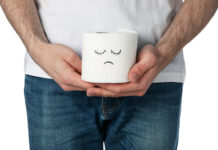Last Updated on February 4, 2021
Doctors say that your stools can tell a lot about your health – and it is kind of true. A healthy person’s stool is usually on the softer side and shaped like a sausage or snake. However, having a slightly harder stool or one with a mushy consistency every once in a while isn’t in itself a reason for alarm, as long as it doesn’t become the norm. The problem is when your poop is completely watery and loose. Diarrhea is an issue that seems to always strike at the most inconvenient moments and often comes with abdominal cramps and an uncontrollable urge to go to the bathroom. In this article, we’ll give you a few tips that can help you deal with diarrhea and make it stop. But first, let’s find out a little bit more about this common problem. Diarrhea: causes and complications Everybody has already experienced this bowel disorder. It normally doesn’t last for over a couple of days and stops spontaneously. If you experience diarrhea for more than a week, that means there is probably an underlying condition causing it that needs to be addressed. Especially if there are other warning signs involved. Fever, bloating, abdominal pain and cramps, nausea, and blood or mucus in the stool are the main symptoms usually associated with diarrhea. Potential causes of diarrhea include stomach viruses (cytomegalovirus, viral hepatitis, and the Norwalk virus, among others), bacteria and other parasites (especially those found in contaminated food or water), lactose intolerance, digestive disorders (celiac disease, ulcerative colitis, Crohn’s disease, and irritable bowel syndrome), and certain medications. Since germs (like viruses and bacteria) are responsible for many cases of diarrhea, it is important to highlight the need for good personal hygiene. Washing your hands regularly (and properly), disinfecting surfaces, avoiding sick people, and being very careful when preparing food are key steps to prevent diarrhea. Diarrhea drastically increases the risk of dehydration. In fact, that is precisely what you have to worry about. So watch out for signs like excessive thirst, dry mouth, fatigue, weakness, dizziness, and dry skin. Keep in mind that dehydration is particularly dangerous in children, seniors, and individuals with a weakened immune system.
































